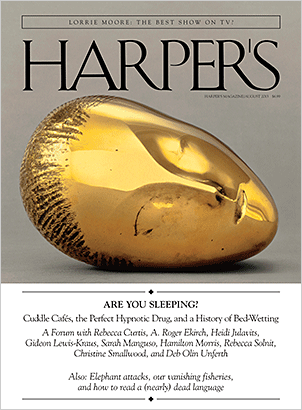Introducing the August 2013 Issue
How we sleep (or don’t), the decline of North American fisheries, and scent sense
This month, we’ve published a Forum on something precious and, for many of us, elusive: a good night’s sleep. We asked some of our favorite writers to participate — Rebecca Curtis, A. Roger Ekirch, Heidi Julavits, Gideon Lewis-Kraus, Sarah Manguso, Hamilton Morris, Christine Smallwood, Rebecca Solnit, Deb Olin Unferth — and although some of them had to work through the fog of a sleep-deprived brain, the essays they have produced are funny, informative, and heartfelt. Our Forum, “Are You Sleeping?,” covers such topics as bed-wetting cures, cuddle clinics for Japanese bachelors, self-experimentation with gray-market insomnia treatments, how to keep from killing your noisy neighbors, and the superhuman feats of nursing mothers.
The Sea of Cortez, which separates the Baja California peninsula from the mainland of Mexico, was until quite recently so abundant in sea life that Jacques Cousteau dubbed it the “Aquarium of the World.” Once host to a thousand species of fish, porpoises, shrimp, and turtles, the sea is being emptied by a combination of small fishing boats called pangas and large industrial trawlers. Reporter Erik Vance spent several months in the Baja, talking to fishermen and trawler operators, as well as marine biologists and shrimp farmers. He found that as the fish population declines, hookah divers along the peninsula’s shores will be forced to deeper, more dangerous depths; fishermen will have to harvest less-desirable species such as jellyfish; and many will turn to other livelihoods, such as running drugs. What is happening to the Sea of Cortez, Vance says, is essentially an early-warning signal for the world’s oceans.
Beau Friedlander explores the biology of smell, covering its history, its attendant superstitions, and its modern-day exploitation by everyone from hotel chains to the U.S. military. In his account, the odor of death is revealed as a potential weapon, while the odor of newly fallen rain becomes the Holy Grail of perfume research. This miscellany is also packed with fascinating tidbits: house flies smell with their antennae; salmon can sniff out their ancestral spawning streams from thousands of miles away; Helen Keller could deduce a person’s occupation by the scent of his or her clothes.
Elsewhere, Lorrie Moore reviews Jane Campion’s mini-series Top of the Lake, and Michelle Orange discusses Richard Linklater’s conjugal trilogy, which just wrapped up with Before Midnight. Thomas Frank, who began his career with a book about American advertising in the Sixties, finally turns his attention to Mad Men and its discontents. And in this month’s fiction, “The Way Things Are Going,” Lynn Freed expertly fuses South African politics with the struggle of an individual family.



